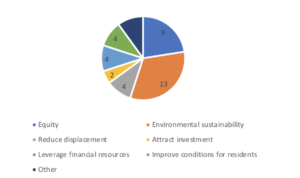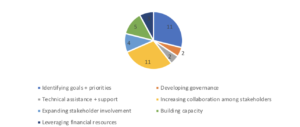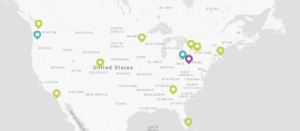In 2017, EcoDistricts Certified was launched to spark a new approach to urban regeneration that recognizes that our industry needs to deepen its commitment to equity, resiliency, and climate action. Guided by the EcoDistricts Protocol, neighborhoods pursuing EcoDistricts Certification commit to an inclusive and comprehensive equitable and sustainable development strategy to guide long-term investments. Each step along the EcoDistricts journey – from setting a vision, to developing an inclusive governance team, to designing a comprehensive performance roadmap is verified to ensure rigor, transparency, and accountability.
Four years later after its launch, 18 projects in the US and Canada are pursuing Certification, with three achieving Certification to date. Each project is unique and represents a mix of typologies from neighborhoods with institutional anchors, to brownfield redevelopments to existing low-income communities struggling with disinvestment or the threat of gentrification. Hundreds of other communities are using the Protocol to guide a wide range of projects from small multi-block redevelopments to complex neighborhood revitalization efforts spanning hundreds of acres.
In 2019, we began a deliberate process of reviewing the Protocol and EcoDistricts Certified. We gathered a group of leading urbanists to generate feedback and identify key trends, surveyed EcoDistricts Accredited Professionals, and examined the latest rating systems. We also interviewed projects pursuing Certification to evaluate their progress and experiences and assess how well the performance criteria reflected their priorities. And in 2020, the world changed, providing further context from which to examine the efficacy of Certification in the context of an unprecedented and interconnected heath, economic, racial justice, and climate crisis.
Key findings focus on two major themes: 1) there is strong enthusiasm for how the Protocol is structured and focused on the issues of equity and resilience, and 2) Certification is difficult due to the complexities of multi-stakeholder collaboration, lack of funding to support planning and governance development, and weak regulations. Overall, over 80% of those surveyed, responded that EcoDistricts Certified is an important market transformation tool. In addition to more general impressions, we received a number of proposed technical fixes and requests for additional clarity in the areas of equity and governance. Finally, we heard from a variety of project teams and advisors that clear guidance is needed for cities in the areas of EcoDistricts policy and regulatory recommendations.
With our assessment over, we have moved into drafting an updated version of both the EcoDistricts Protocol and EcDistricts Certified. In March, we will begin an external review process with key content area experts to help strengthen each of the Imperatives, Priorities, Indicators, and verification requirements. We are also starting to scope a Policy and Regulatory playbook for cities to support EcoDistricts development. We expect to launch EcoDistricts Certified 2.0 in the fall. Stay tuned and reach out if you would like to get involved in reviewing draft documents.
Our 2020 survey of Certified community leaders and participants yielded the following comments and information:
“EcoDistricts Certified has provided an adaptable framework to guide us and encourage us to think critically about the integration between social equity, resilience, and environment. It also holds us accountable for implementing our plan and provides peer learning opportunities so that we, like-minded community champions, can all move forward together, stronger.”
What we learned:
- Over 80% of the districts pursuing Certification believe that the tool is critical to transforming the real estate and community development industry.
- Participating districts value that Certification is a process-based framework, vs a prescriptive rating system.
- A key benefit of Certification is that there is an accepted professional standard that communities can measure themselves against.
- The language and terminology used in the Protocol and Certified Handbook are unnecessarily complicated.
- There could be more substance added to the Project Formation phase, specifically with resources or guidance around community organizing, assembly of capital, and alignment with local policy. More explicit requirements considering the diversity and makeup of the decision-making body would further enforce the importance of governance structure.
- The Imperative definition of equity should be more explicit about diversity and how it influences outcomes and the wide-ranging impacts of an equitable EcoDistrict.
How we’re responding:
- We’re exploring transitioning from a formal certification process to promoting and supporting a framework usable by any community. This includes training and technical assistance to create an EcoDistrict and also “endorsement” of those that meet EcoDistricts standards. This is a subtle but significant pivot away from a third-party verified certification standard to a rigorous but internal seal of approval.
- We’re considering offering a combined Protocol/Certification Handbook as a single document for ease of reference and use – either as a printed version or an online tool.
- We’re encouraging participants to use their own language and narratives based on what is important to them. As long as they document how their language aligns with the Imperatives and Priorities, they meet EcoDistricts intent.
- We will invite a technical expert to review each Protocol Priority name, goal statement, objectives, strategies, indicators, and exemplars and recommend changes and additions to reflect best practices in that field.
Why is your district seeking Certification?

What is working best about your journey through Certification?

Impact to Date
- 18 Registered Projects, representing
- 15 Cities
- 2 Countries
- 16,000+ acres
- 400K jobs and residents

Projects Pursuing EcoDistricts Certified
- ATL Ecodistrict, Atlanta, GA
- Capitol Hill EcoDistrict, Seattle, WA
- Central Area Culture District, Seattle, WA
- East Harbour, Toronto, Ontario, Canada
- Etna EcoDistrict, Etna, PA*
- High Falls EcoDistrict, Rochester, NY
- Little Haiti Ecodistrict, Miami, FL
- Lloyd EcoDistrict, Portland, OR
- MetroHealth Community District, Cleveland, OH
- Millvale, PA*
- RINO Art District, Denver, CO
- Sharpsburg, PA*
- Slavic Village, Cleveland, OH
- Sun Valley Ecodistrict, Denver, CO
- Talbot Norfolk Triangle Eco Innovation District, Dorchester, MA
- Towerside Innovation District, Minneapolis, MN
* Certification complete

